#syrian literature
Explore tagged Tumblr posts
Text
I was wounded early, and early I learned that wounds made me.
Adonis, Celebrating Childhood (Selected Poems, 2010)
#quotes#Adonis#Selected Poems#Celebrating Childhood#2010#2010s#Syrian literature#Syrian poetry#trauma#c-ptsd#favs#tw: abuse
18 notes
·
View notes
Text
the more I read Arabic (Syrian) literature the more I feel the need to translate them to English. The world must experience the joy of reading those amazing works of art. I never believed that the Syrian novel scene was strong. We're good at art, acting, and making TV dramas. I was perhaps misled (or turned off) by a couple of boring novels with simple messaging. But lately, and especially with the fall of the regime, I've picked up Syrian literature once more and I've experienced a revelation.
#i need to finish a novel that I hated by Haider Haider titled the desolate time#I just don't think the arabic language lends itself well to stream of consciousness#or just that Haidar doesn't use it effectively#Syrian literature#Syria#novel#literature
3 notes
·
View notes
Text
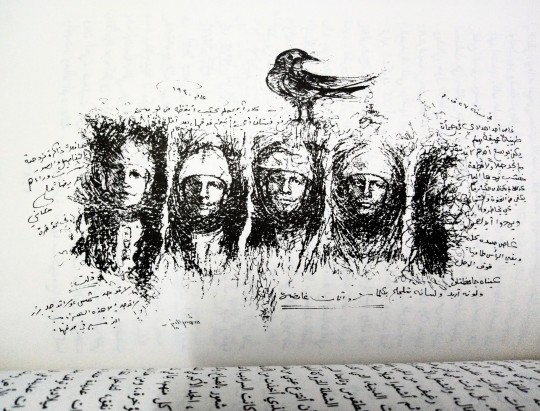

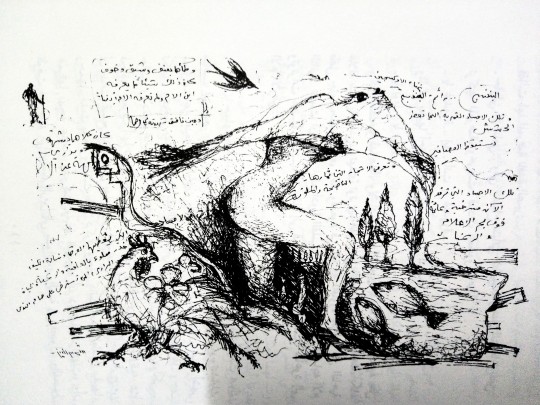

Saadallah Wannous, On Memory And Death
Published in 1997/ a imaginative mélange of essay with short story & play formats
#literature#tragedy#syrian literature#syrian writers#sketches#plays#theatre#book illustrations#books
0 notes
Text
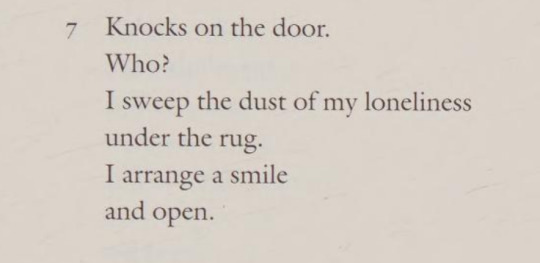
Maram al-Massri, from A Red Cherry on a White-Tiled Floor (trans. Khaled Mattawa) [ID'd]
#q#lit#quotes#poetry#typography#id included#maram al massri#a red cherry on a white-tiled floor#syrian lit#swana literature#reading#i wandered lonely as a cloud#m#x
2K notes
·
View notes
Text
My lover asks me: "What is the difference between me and the sky?" The difference, my love, Is that when you laugh, I forget about the sky.
My Lover Asks Me, Nizar Qabbani
#your laughter fills me like a bell#my lover asks me#nizar qabbani#poetry#literature#syrian poets#dark academia#classic academia#light academia
292 notes
·
View notes
Quote
It’s not a bad thing, if you’re responsible about it. Just don’t start having boyfriends. Wait until you’ve found your husband.” “And how am I supposed to find a husband if I can’t have a boyfriend until then?” I asked ironically.
Zack Love, The Syrian Virgin
#Zack Love#The Syrian Virgin#quotelr#quotes#literature#lit#christianity#contemporary#faith#family#life#life-lessons#love#marriage#mother-daughter-bond#syrian-civil-war#tradition#wisdom#women
11 notes
·
View notes
Text
"My letters to you
Are greater and more important than both of us.
Light is more important than the lantern,
The poem more important than the notebook,
And the kiss more important than the lips.
My letters to you
Are greater and more important than both of us.
They are the only documents
Where people will discover
Your beauty
And my madness."
Nizar Qabbani.
#nizar qabbani#bookblr#books and literature#love#writing#literature#short poetry#reader#academia aesthetic#nizar qabbani poetry#arabic poems#desiblr#love letters#arabic#syrian poet#writerslife#writers on tumblr#reading#reading in 2023#writeblr
13 notes
·
View notes
Text

Chronicles of Oklahoma, Volume 64, Number 2, Summer 1986.
Caldwell, Tom. From the Hills of Lebanon: The Syrian-Lebanese in Oklahoma, article, Summer 1986; Oklahoma City, Oklahoma.
Source: https://gateway.okhistory.org/ark:/67531/metadc2031529/m1/1/
#oklahoma#Oklahoman#Oklahoman history#Syrian#syrian history#Lebanese#Lebanese history#Lebanon#middle eastern history#modern history#American history#literature#America
0 notes
Text
🏀⛹🏿⛹🏿♂️
#louis vuitton#lebanon#live#london#los angeles#lol#lit#landscape#literature#love#long reads#life#self love#legs#malaysia#musician#music video#military#mexico#makeup#marvel#meme#music#democratic republic of the congo#syria#syrian arab army#countryhumans syria#save syria#سوريا syria#syrian refugees
0 notes
Text
Arabic in the batfam
@leefail has gotten me obsessed with how arabic would work in the batfamily
because arabic is natively spoken by 230 million people and is taught in any muslim majority to country because its considered poor faith to recite the Quran in any other language.
its also the most inconvenient and stupidly difficult language to learn in human history.
why?
because it is a colonial language
meaning the Arab empire happened and we all switched to arabic but unlike English... there wasn't the internet for people to learn how the 'og Arabs' spoke it and Arabs didn't slaughter and replace like the puritans they just taxed and converted (slaughter optional im not ignoring north Africa but it was region specific)
so that means that arabic which has a collective vocab of about 12.1 million words as well as a nasty habit of giving 100 words the same meaning as well as assigning 1 word like 8 meanings got practiced by these arabic speaking countries differently
so certain words fell out of use or changed meaning in one country while being startlingly popular in another
it also means that a lot of arabic regions maintained their older speech patters
latinised softer letters in levant countries closer to Cyprus due to the presence of Aramaic, syrianic and latin.
harsher more guttural sounds in regions that were closer to Iran.
so what does this mean? and Why does this mean arabic is a bitch to learn
well for one you don't write in your regional dialect, you write in modern standard or fus7a which is a whole other beast. Meaning that you don't really learn to speak in school.
two the dialects are significantly different enough across the region that people who learned arabic in Lebanon won't understand people from morocco.
now we are all SUPPOSed to speak Modern Standard Arabic but you have to understand how little it is used outside of like legal jargon. so you kinda lose it once you leave Arab formal education.
Which means if you immediately default to MSA 99% of Arabs will assume you are a cop like if you know the word for government but not skirt... come on man be less obvious.
Now most us speak 1 -3 dialects and understand 9-10
me personally I speak a levantine dialect and can understand most Egyptian, Jordanian and Gulf dialects. Iraqi and the rest of North Africa (with the exception of Tunisia) not so much.
Now what does that mean for arabic in the batfamily
its too useful for the Bats to not use
so do all of the bats speak arabic 1000%
Do all of them speak different dialects 1000%
Here they are imo
Bruce: Bruce is a cop (MSA) He can code switch and speak all the dialects but he just genuinely likes MSA, its the most complex and intricate form of the language and what's most commonly used for things like poetry and literature. But it does mean that his speech comes off very stilted and cringeworthy to most Arab speakers. The first dialect he learned was definitely Egyptian because its the one that's the most common in music and television as well as having the largest group of people speaking it (110 of the 230 million are from Egypt)
Dick: now I have no evidence for this but Dick Grayson would speak Lebanese arabic. It's notoriously the softest of the dialects and has the most higher pitched and flippy tones. His mother also grew up in France which would Fit for Dick since Lebanese Arabic tends to substitute harsher arabic words with French. the most common greeting in Lebanon is 'Hi, kefak ca va' which is English, arabic and French. And for a cameleon character with such an interesting and convoluted ethnic background I think picking the softest dynamic tongue with the most intersectionality fits.
Jason: Jason todd speaks Jordanian arabic, Jordanians are the most hilariously creative people in the mid east imo. there are turns of phrase from Jordan that kinda make you pause and blink for a second because damn... okay then. I have never met a Jordanian without a degree in the most creative insults you've ever heard. Jordanian arabic is also very close to stereotypical Levant arabic which still maintaining a lot more of the harsher more guttural sounds that countries like Lebanon and Syria tend to exclude. Jordan also has a huge Bedouin population and I just think he'd match that vibe
Tim: Tims parents were archeologist.. Egyptian. Tim has the heaviest Egyptian accent when he speaks arabic. His parents definitely had him learn it in hopes he'd follow their footsteps. Ja become Ga and he works so damn hard to keep the accent out of his words to try and hide any identifiers and he fails miserably. He also uses it the most out of the kids and he can read and understand MSA fluently unlike Dick and Jason who are fine readers but cannot speak it for the life for them. Tim also does the international students Mix and Match where you sometimes just use a word that's country specific to other countries. Tim doesn't tell Damian he understands it and so Damian has the most intense shock of his life when Tim replies back to his angry arabic muttering.
Damian: So I know that talia studied at the university of Cairo but I feel like Ra's speaks a very old form of arabic so I think Damian code switches quite often. I picture him speaking like a Saudi upper court dialect when he's talking with Ra's and I think talia does the same. But I think Damian is most comfortable somewhere in-between Jordan and UAE arabic with more levant terms of endearment (because of the aforementioned softness and ik talia isn't a soft parent in canon but she is one in my heart so there) and more casual speech following GCC speaking patterns. Tho I think Damian can understand and speak all of the dialects including the less popular ones like Moroccan daraji.
Steph: I have zero evidence and not even an elaboration but if steph was Middle Eastern she'd be Iraqi bc vibes so that's what she speaks fuck you im right. It's definitely on the harsher side tonally but idk she gives the energy of using it and teasing Jason and Dick for using frou-frou arabic. Tho I will absolutely make the argument that she learned Syrian arabic for a friend pre her involvement with the bats.
Also Steph, Dick and Jason do sip and bitch sessions and they disagree on the correct way to make coffee. Jason is absolutely a traditionalist, Dick is a Turkish coffee believer and steph adds way too much cardamom.
also also Jasons favorite poet is Darwish, Tims fave is Al-muttanabbi, Dicks is Gibran (ik he spoke mostly in English but tell me Dick Grayson isn't gonna freak over 'your children are not yours they are children of the world') , Bruces is Qabbani. Steph doesn't like poetry but she has absolutely read memoirs of a woman doctor by nasal el saadawi and loved it
#dick grayson#bruce Wayne#tim drake#Damian Wayne#jason todd#batfam#batfamily#nightwing#batman#comics#red hood#arabic info dumps#im so homesick for the Middle East y'all#you don't understand#im writing this instead of studying for my exams#im arab so all my faves are vaguely Arab coded
271 notes
·
View notes
Text
Writing Notes: Science Fiction

Science fiction - a genre of speculative fiction that contains imagined elements that don’t exist in the real world.
It spans a wide range of themes that often explore time travel, space travel, are set in the future, and deal with the consequences of technological and scientific advances
Subgenres & Related Genres of Science Fiction
Fantasy fiction: Sci-fi stories inspired by mythology and folklore that often include elements of magic.
Supernatural fiction: Sci-fi stories about secret knowledge or hidden abilities that include witchcraft, spiritualism, and psychic abilities.
Utopian fiction: Sci-fi stories about civilizations the authors deem to be perfect, ideal societies. Utopian fiction is often satirical.
Dystopian fiction: Sci-fi stories about societies the authors deem to be problematic for things like government rules, poverty, or oppression.
Space opera: A play on the term “soap opera,” sci-fi stories that take place in outer space and center around conflict, romance, and adventure.
Space western: Sci-fi stories that blend elements of science fiction with elements of the western genre.
Cyberpunk: Sci-fi stories that juxtapose advanced technology with less advanced, broken down society.
Steampunk: Blend technology with steam-powered machinery.
Classic Elements of a Science Fiction Novel
Time travel
Teleportation
Mind control, telepathy, and telekinesis
Aliens, extraterrestrial lifeforms, and mutants
Space travel and exploration
Interplanetary warfare
Parallel universes
Fictional worlds
Alternative histories
Speculative technology
Superintelligent computers and robots
Tips for Science Fiction Writers
Draw inspiration for your story from real life. Take an idea from current society and move it a little further down the road. Even if human beings are short-term thinkers, fiction can anticipate and extrapolate into multiple versions of the future.
Do some research. It may seem paradoxical, but research will strengthen your project, no matter how far you end up straying from historical facts. Conducting research too early in the drafting process can sidetrack or slow down the plot, but it’s critical to keep your reader immersed in and believing the world you’ve created. Getting the details wrong can throw off their belief in your story.
Create a set of rules for the world of your novel—and stick to them. Sci-fi is not automatically interesting; it must be made compelling, plausible, and accurate within its own set of rules. Rules add weight to the material or change the stakes for your characters and/or readers. Once you establish a rule, if you break it, you break the illusion of a believable and compelling world.
Keep it grounded in reality. Any technological or fantastical element in sci-fi should have roots in what our current species can already do or is on the road to being able to do.
The History of Science Fiction Literature
The science fiction genre dates back to the second century.
A True Story, written by the Syrian satirist Lucian, is thought to be the first sci-fi story, which explored other universes and extraterrestrial lifeforms.
Modern science developed during the Age of Enlightenment, and writers reacted to scientific and technological advancements with a wave of sci-fi stories like New Atlantis by Francis Bacon (1627), Somnium by Johannes Kepler (1634), and Comical History of the States and Empires of the Moon by Cyrano de Bergerac (1657).
Classic Science Fiction Novels to Know & Read
Familiarize yourself with these classic works of science fiction that inspired novelists and screenwriters in many different genres. Many have been turned into movies and television shows:
20,000 Leagues Under the Sea by Jules Verne (1870): features underwater exploration and a technologically advanced submarine—two things that were primitive at the time the novel was written.
The War of the Worlds by H. G. Wells (1898): tells the story of Martians invading Earth and includes themes of space, science, and astronomy.
Brave New World by Aldous Huxley (1932): set in a futuristic dystopian world with many scientific developments where people are genetically modified.
Who Goes There? by John W. Campbell (1938): tells the story of an alien creature that’s a shape-shifter and has the gift of telepathy.
Foundation by Isaac Asimov (1942): follows a galactic civilization after their empire collapses.
1984 by George Orwell (1949): set in a dystopian version of the year 1984 where the world has succumbed to extreme levels of government interference in daily lives.
Fahrenheit 451 by Ray Bradbury (1953): set in a futuristic dystopian society where books are banned and will be burned if found.
Stranger in a Strange Land by Robert Heinlein (1961): tells the story of a human who was born on Mars and raised by Martians who comes to live on Earth.
The Man in the High Castle by Philip K. Dick (1962): set 15 years after the end of World War II, offers an alternate history of what could happen if the Axis Powers had defeated the Allied Powers.
Dune by Frank Herbert (1965): set in an interstellar society in the distant future.
2001: A Space Odyssey by Arthur C. Clarke (1968): tells the story of ancient aliens who travel the galaxy and help develop intelligent life forms in other worlds.
The Handmaid’s Tale by Margaret Atwood (1985): tells the story of the women who lose their rights after a totalitarian state overthrows the U.S. government.
Common Characteristics of Science Fiction
Science fiction is often called the “literature of ideas.”
Sci-fi novels include a wide variety of futuristic concepts.
Since they’re so imaginative, anything is possible, especially in soft sci-fi novels.
It can be about space, time travel, aliens, or time-traveling aliens in space.
Regardless of the setting and characters, all sci-fi stories are complex, contain nuanced detail, and explore larger themes and commentary—sometimes satirically—about society beneath the surface.
Hard Science Fiction vs Soft Science Fiction
Science fiction is divided into 2 broad categories:
Hard sci-fi novels are based on scientific fact. They’re inspired by “hard” natural sciences like physics, chemistry, and astronomy.
Soft sci-fi novels can be two things: Either they are not scientifically accurate or they’re inspired by “soft” social sciences like psychology, anthropology, and sociology.
The terms are somewhat flexible, but they help readers quickly understand the foundation of a novel and what to expect from it.
Source ⚜ More: Notes ⚜ Writing Resources PDFs ⚜ Word List: Science Fiction
#science fiction#writing notes#writeblr#literature#writers on tumblr#writing reference#dark academia#spilled ink#writing prompt#creative writing#writing inspiration#writing advice#on writing#writing ideas#genre#writing resources
102 notes
·
View notes
Text
I am not a girl in that moment, or a boy, but a person-shaped beam of light, and we see each other as we are, as energy that has willed itself into these bodies because the desire to dance is the first kind of longing.
Zeyn Joukhadar, The Thirty Names of Night
#Zeyn Joukhadar#The Thirty Names of Night#gender#people#humanity#energy#dancing#light#Trans Day of Visibility#Trans Visibility#LGBTQ author#LGBTQ literature#queer author#queer literature#trans author#Syrian literature#American literature#quotes#quotes blog#literary quotes#literature quotes#literature#book quotes#books#words#text
6 notes
·
View notes
Text
i read In Praise of Hatred by Khaled Khalifa.
not surprisingly the main theme of the novel is hatred; hatred of the other, and more importantly self-loathing. we're taught to hate ourselves from the minute we leave our mother's wombs. as girls we were taught to hate our bodies and our sexuality as shameful and sinful. we are forced to hide it away under thick clothing and hijabs. our bodies are temptations that should be resented.
that theme really clicked with me as also a girl who was sent by her mom to mosque circles where they made me hate myself and my body.
but the book is wonderful because Khalifa weaves those themes of hatred with the real events from Syrian history from the 80s; the rise of the muslim brotherhood and their dreams of an islamic state, and the terrible massacres committed against them. he doesn't make them look good tho, despite the suffering he still shows their terrorist repressive ideology. such religion was invented in the 20th century.
the parties are never mentioned by name but only referred to as our sect and the other sect. both sects are aware that they're using religion to have political power. both are aware that it's not only a war over religion. both sects exploit young men to fight and die for them. radicalising young bourgeois men into jihad, and young farmer men who have no other choice to become tools of the regimes to commit crimes against their people.
but it's not just about hatred as on top of that he weaves fantastical stories about love, sex, and riches. the mundane day to day life is always present and the complicated relationships between family.
notably, there's a story about bakr working for a Saudi prince traveling around Persia trying to furnish a palace that feels like the womb of his mother.
#syrian literature#syria#in praise of hatred#khalid khalifa#في مديح الكراهية#خالد خليفة#سوريا syria#free syria#syrian novel#literature#novel
0 notes
Text
boycott everything russian!
please boycott and don't spread russian music, literature, movies, series, art and russian artists! don't use trending russian music on Instagram or TikTok, don't popularize the culture of a terrorist country!
and please be sure to point it out to other social media users. this is the minimum you can do to avoid unnecessary trauma to the victims of russian aggression. the victims should not see the tolerance of the culture of the state that kills and tortures them every day, that destroys entire cities and creates environmental disasters killing hundreds of people!
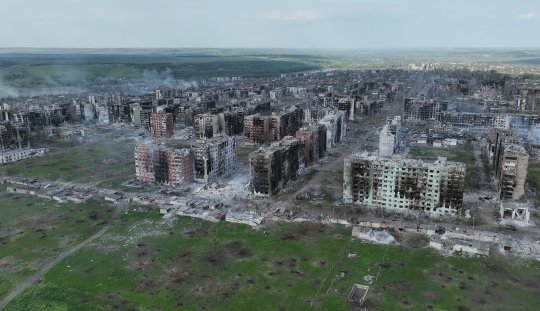
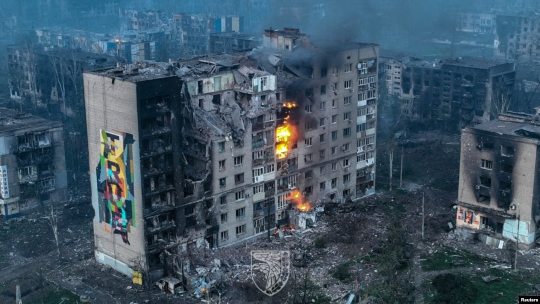
earlier I wrote about why it is important to realize the level of guilt of the russians and not tolerate everything russian, in order to show the whole world and the russians themselves that their culture of terrorism and dancing on bones will not be tolerated in a civilized society!
russia is currently waging a full-scale genocidal war against Ukraine and taking part in the genocide of the Syrian people who are suffering from the terrorism of dictator Bashar al-Assad!

please show your respect and tolerance for Ukrainians and Syrians, boycott everything russian and educate others! do your part in the information war against imperialist xenophobic racist homophobic and nazi russia!
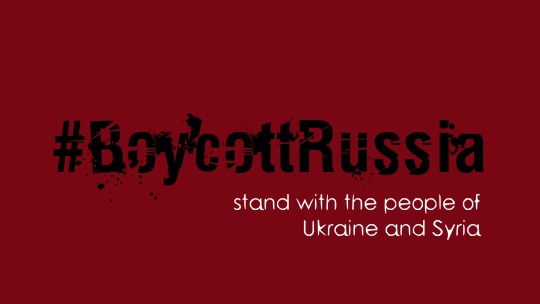
#boycott russia#boycott russian culture#boycott russian music#boycott russian sport#boycott russian artists#russia is a terrorist state#stand with ukraine#stand with syria#help ukraine#support ukraine#save ukraine#ukraine#free syria#syria#stop russia#russian terrorism#fuck russia#russian invasion#russia#signal boost#important#current events#tiktok#instagram#russian art#russian music#russian culture#russian
615 notes
·
View notes
Text

Maram al-Massri, from A Red Cherry on a White-Tiled Floor (trans. Khaled Mattawa) [ID'd]
#q#lit#quotes#poetry#typography#id included#maram al massri#a red cherry on a white-tiled floor#syrian lit#swana literature#reading#the lovers#m#x
2K notes
·
View notes
Text
vague theory on the MTEFIL demon lords.
spoilers through 83 below. not a theory so much as a collection of random thoughts linking them up with their sources in christian folk tradition (and sometimes the bible) and musing on what that all means.
tl;dr: not even really a theory so much as I'm just collating a lot of information about the demons (and angels) that might not be clear if you're not familiar with certain parts of the western canon. the seven demon lords consist of four definitely fallen angels, two angels with weird statuses (Satan and Lucifer, naturally), and one of God's creations which is not actually an angel at all (Leviathan). The angels likely fell as a result of their own efforts to rebel against heaven, as in Paradise Lost. Support for this is clear in the manga's imagery and the few hints we have about Lucifer and Satan. A lot of this is just basic "western ideas about Satan" stuff but I figure not everyone has that knowledge base to work from.
first off, their names. Beelzebub, Belphegor, and Asmodeus in the Judeo-Christian tradition are all explicitly based on or at least share names with gods or demons or spirits from other religions. Beelzebub (as Ba'al Zevuv) and Belphegor (as Ba'al-Peor) are both named as false gods of the Philistines and Moabites respectively in the Old Testament* and Asmodeus, though only named in nonbiblical sources, is likely derived from the Zoroastrian "Aesma-Daeva". Mammon arguably also belongs with this group; though usually taken just to mean wealth or money, plenty of later writers baselessly asserted that Mammon was a Syrian god, so he probably fits in this category.
Satan is the only actual arguable biblical angel on the list, with "satan" or "the satan" appearing most famously as one of the "sons of God" (generally agreed to be angels) in the book of Job, where his role appears to be to test and prosecute (in a partially legal/courtroom sense) the faithful. "Lucifer" is a name closely identified with angels and Satan because of a particular verse (Isaiah 14:12) that used to translate a particular phrase that way. Because the passage describes the subject of the phrase being cast down by God, the verse is closely linked to the idea of fallen angels, though most modern translations render the phrase as "morning star" and the whole thing is textually about a particular unnamed Babylonian king anyways.
*using catholic terms here because, well, it's a manga about catholicism. probably gonna get some stuff wrong though
Of course, the most famous instance of Satan/Lucifer has very little to do with the Bible, because it's Milton's Paradise Lost! Plenty to say about this later, but for now what's interesting is that Lucifer is what he is called in Heaven, prior to the Fall, as afterwards all the names of the fallen angels (a third of heaven!) are spoken no more. So they are one and the same person: depending on who you ask, a charismatic rebel or self-serving striver, widely regarded as one of western literature's archetypal anti-heroes.

Traditional Christian angelic hierachies list the angels as Seraphim, Cherubim, Thrones, Dominations or Dominions, Virtues, Powers, Principalities, Archangels, and Angels, descending in order of authority. Milton...doesn't really give a shit about any of this, and sets up a situation wherein Archangels are the highest, with Raphael, Michael, and Gabriel described as Archangels (and therefore among the most powerful), same with Lucifer. Cherubs are implied to be a lesser order (at one point Lucifer disguises himself as a "stripling cherub"), which seems to line up with MTEFIL/EkuOto's world, in which the ability of Mr. Priest and Leah to call upon the archangels' powers means they are able to call on the forces closest to god. Similarly, Beelzebub refers to the purified bit of Asmodeus as "cherub," suggesting she's of a lower order than the archangels prior to her fall (and in turn suggests whatever he is at this point, it's not, strictly speaking, an angel).

The real pattern-breaker is Leviathan. Derived from an Ugaritic mythical sea serpent, Leviathan is a tannin, or sea-monster. Tanninim appear several places in the Old Testament, most notably Genesis (where God creates them in the very first chapter), and are often translated into English as "great whales" or "sea creatures" but are in fact not quite 1:1 with any animal. Leviathan's most notable appearance is in Job 39 and 40, where as part of his defense against Job's accusations (the Book of Job is really a courtroom drama), God says, in essence, "you all won't even fight leviathan. wait do you not know leviathan? lmao you don't even know leviathan. leviathan is this CRAZY sea serpent that breathes fire and breaks iron like wood. anyways if you aren't even brave enough to fight leviathan you ABSOLUTELY are not a bad enough dude to question me."
What's most interesting is that this positions Leviathan firmly as one of God's creations! And in fact, when Leviathan references the command God gave her to be fruitful and multiply in the ocean, she is both quoting Genesis directly and giving us a very clear idea of her origin: she was made on the fourth day with the other tanninim and creatures of the water and air. which is to say, she precedes humans!

So we have four lesser demon lords based on other religious traditions, two angels of biblical extraction (but really mostly Miltonian), and one of God's creatures. And actually, the visuals we've given largely line up with that!
Early on, Mr. Priest gives us a glimpse of the demons. It's impressively consistent with what we've seen so far: Asmodeus has her tower of bodies, Mammon's rings show up, Gluttony has the same ink-silhouette-mouth thing going on, Leviathan's child form is visible within her monster form's mouth behind the speech bubble naming her, and Belphegor has the snail imagery!
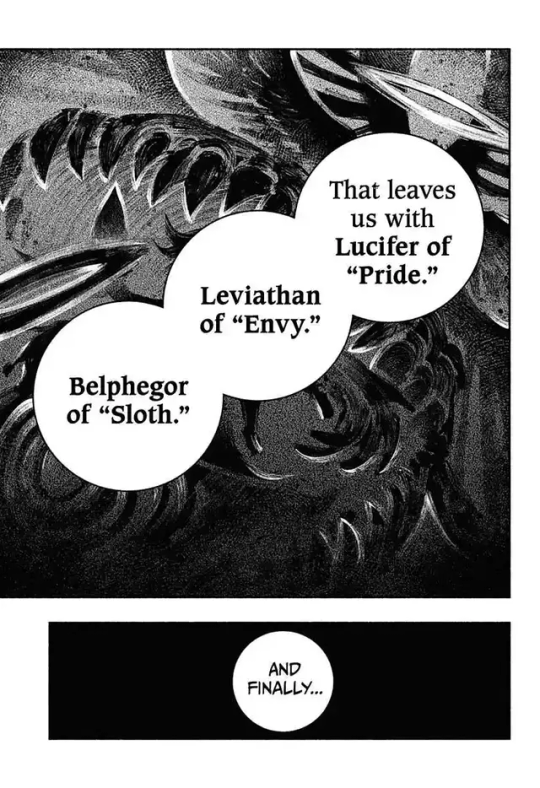
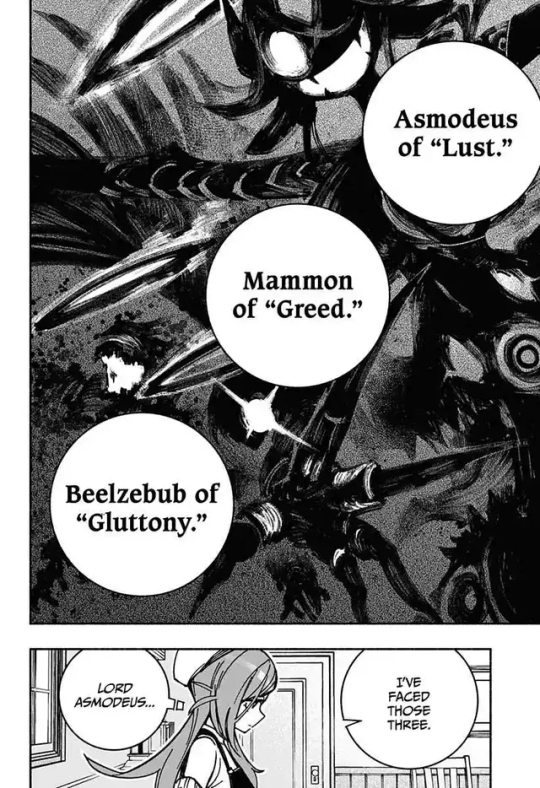

but also helloooooo look at their fucking halos. Six halos for seven demon lords...because Leviathan doesn't have one because she was never an angel in the first place, just one of God's creations. four of the halos are black, because these are fallen angels, but two of them are white. Why are you white? Were Satan and Lucifer archangels, and therefore incorruptible on some essential ontological level? Have they somehow been re-purified since the fall?
And why is Lucifer depicted with a halo and six wings, exactly like a classical Christian Seraphim?
The Seraphim being the highest order of angels in Christian angelology, nearest to God and eternally singing His praises. They traditionally have six wings, exactly as Lucifer is depicted here.
The final interesting piece of evidence we have about the Seven Demon Lords comes from the end of Beelzebub's fight. He's recalling his final fight with Rosa and her last words to him: "Y'know, I don't wanna dump this on the next generation. But I believe their love will trump your evil. They'll support each other. Help each other. And someday you'll lose to their righteousness." And then Leah drops a sick fucking axe kick on his head and rocks his world.
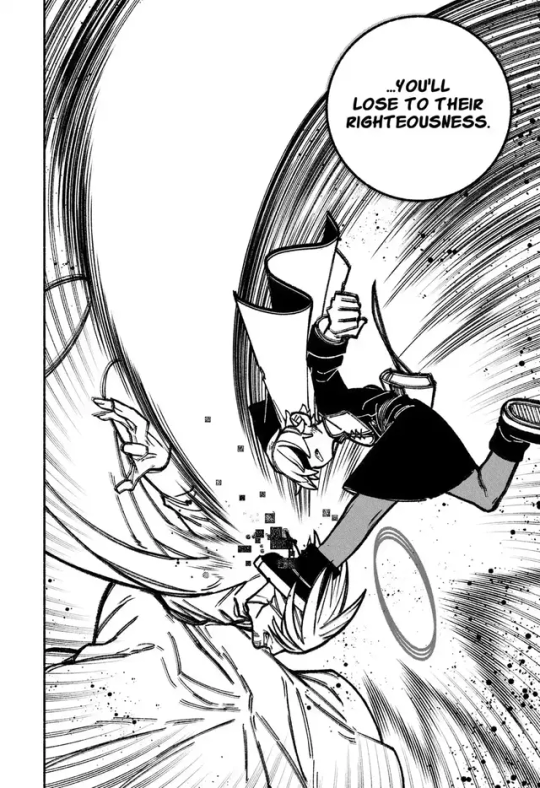
this doesn't have any relevance to the theory post it's just spiritually healing to look at
And then Leah taunts him ("Time for dessert, Lord of the Flies! Have any room left?!") and it's at that moment, when he's getting his ass kicked, that he has an unexpected and thus far totally unexplained flashback to what's very obviously the seven demon lord's tragic backstory as angels:

These are obviously the seven demon lords, not just from the text and Mammon's rings, but because there's only six of them. Which makes perfect sense! There's only six angels in the group, Leviathan presumably was not a part of whatever the angel stuff was!
Of course, the volume extras already came out and said all of this, to some extent!

"a certain researcher's personal note (2)," file 63
At this point it seems pretty clear to me that Aruma Arima is drawing on Milton's Paradise Lost. Interestingly, early on there's a file (from the same researcher who wrote the above, in fact) debating whether the gates of hell for demon lords (rather than regular demons, who get Leviathan's jaws), which look like Rodin's sculpture "The Gates of Hell," look that way because the gate of hell has a perfect Platonic form which Hell uses and which Rodin approached through genius and mastery, or if demon lords just use it because they think it looks cool. I would not be surprised to eventually get a note asking whether Milton received the truth of Paradise Lost from a divine source or if he somehow just guessed it perfectly.
Anyways, Paradise Lost goes like this: Lucifer is among the first of the archangels and everything is vibing fine in heaven. These halcyon days are disrupted when God calls an all-hands and announces His Son is here now and to him shall bow all knees in Heaven (typical nepo baby shit). Lucifer objects to this, refusing to exalt the Son and seeing himself (and, according to his speeches, other angels) as native-born sons of Heaven who bow to none but God. A third of angels join him, there is epic war, they are cast down to the fiery lake, where they are transformed into devils and their angelic names are stripped from them and replaced with the names of demons. As a result, Satan (the artist formerly known as Lucifer) undertakes to tempt man and cause his fall, leading to the main matter of the poem, the events of the Garden of Eden.
Thus, in Paradise Lost's cosmology, all devils were once angels. And this seems to track with a lot of what we have seen so far of MTEFIL/EkuOto's demons! It suggests the Researcher's note is correct: This is, on some level, an enormous family argument, especially if things track closely enough that Hell's demons are really just a third of what Heaven once was. Lucifer once led a rebellion against god, with the other demon lords as his allies; whatever ambitious or noble goals they once had ("Here at least / We shall be free . . . Here we may reign secure, and in my choyce / To reign is worth ambition though in Hell: / Better to reign in Hell, then serve in Heav’n.") they seem to have fallen to fractious squabbling, with Lucifer now absent and Satan seeming to have only limited and minimal authority, if any, with respect to the others.
A few questions this brief review against the classic Western sources raises:
What's up with Satan and Lucifer? Are they indeed somehow split from the same identity, or will this version have them as distinct people? If so, does the fact that Lucifer led the rebellion but is now absent serve as basically the explanation for why the Seven Demon Lords are now so disorganized?
What's up with Satan's wife? Not something he generally has. Is it the notably absent Lilith (who comes from Jewish and Christian folk traditions and not any particular religious text or Paradise Lost)?
Where is Jesus? I mean I don't usually see an anime with Catholic elements and expect there to be any reference to Jesus ever. But Milton's Paradise Lost is very much a Christian text; it is About Jesus as much as it is about anything else. And if the Son of God will not be appearing in this shonen (which, y'know, fair), why did Lucifer rebel?
51 notes
·
View notes